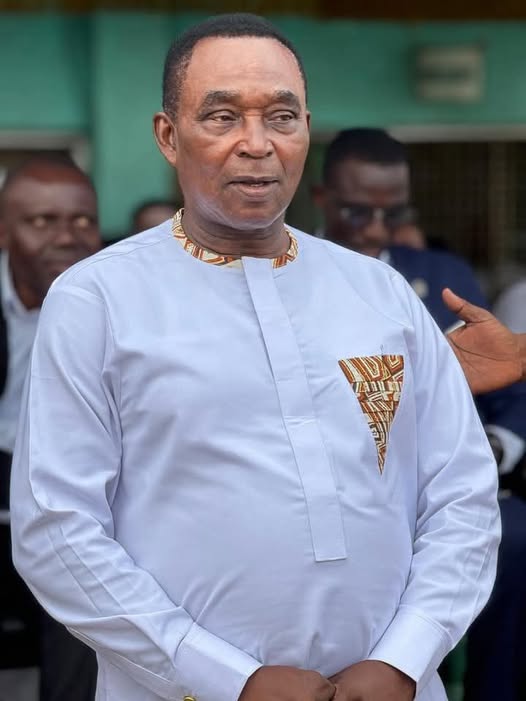The Sekondi-Takoradi Metropolitan Assembly (STMA) held its First Ordinary Meeting of the Second Session of the Ninth Assembly on June 3, 2025. During this significant session, the Metropolitan Chief Executive (MCE), Hon. Lawyer Frederick Faustinaus Faidoo, delivered a comprehensive Sessional Address outlining a vision of transformation aligned with the national Reset Agenda. His address emphasized governance reforms, infrastructural development, enhanced sanitation, strengthened healthcare systems, and improved urban management as central to advancing the metropolis.
Opening his address, the MCE expressed gratitude to the Assembly for their continued confidence and reiterated his commitment to President John Mahama’s Reset Agenda. He pledged to work with the Assembly in a spirit of inclusivity and transparency to deliver measurable outcomes. Demonstrating a proactive stance on institutional efficiency, the MCE announced several strategic administrative changes, including the appointment of Ing. Michael Dzisi as Acting Metro Coordinating Director, Mr. Ghani Muftawu as Metropolitan Finance Officer, and Mr. Francis Armah as Administrator for the Takoradi Sub-Metro. These appointments, he emphasized, are intended to revitalize operations and improve the overall performance of the Assembly.
On security and public safety, Hon. Faidoo highlighted Sekondi-Takoradi’s status as one of the most peaceful metropolitan areas in the country. This, he attributed to the vigilance of the Metropolitan Security Council (MESEC), which actively monitors potential threats and mitigates community tensions through coordinated action. He also announced plans to expand the city’s street lighting systems through public-private partnerships, emphasizing that improved lighting plays a crucial role in curbing criminal activities and supporting economic activity during the night.
In discussing development financing and resource allocation, the MCE noted that infrastructural deficits remain a priority for the Assembly. He emphasized the critical role of revenue generation in delivering services and shared that for the first quarter of 2025, the Assembly had achieved an internally generated revenue (IGR) performance of 85.7%, while expenditure stood at 79.7%. He acknowledged these as encouraging figures but noted that there must be continuous realignment of budgetary priorities to meet pressing needs. A key component of the fiscal strategy involves early engagement with Ratepayer Associations as part of the Fee Fixing process for the 2026 fiscal year. Additionally, the Assembly is awaiting disbursement under the Metropolitan Budget Support Programme, which is expected to feature in the mid-year budget review. These financial strategies, the MCE affirmed, aim to bolster the Assembly’s fiscal independence and effectiveness.
Environmental sanitation was addressed with a firm sense of urgency and responsibility. Hon. Faidoo outlined the Assembly’s goal to make Sekondi-Takoradi one of Ghana’s cleanest cities. He reported intensified efforts to manage waste effectively, including the desilting of storm drains and the decommissioning of legacy dumpsites, especially in flood-prone areas. He also announced plans to distribute sanitation tools to all electoral areas and urged Assembly Members to actively encourage their constituents to participate in national sanitation exercises. These interventions, he stressed, require active citizen participation and sustained inter-agency coordination.
Public health formed another cornerstone of the address. While the city continues to lead the Western Region in tuberculosis control, having been nationally recognized for excellence, significant challenges remain. Maternal mortality is alarmingly high, with a reported 384 deaths per 100,000 live births. The doctor-to-patient ratio stands at 1:3,178, and the nurse-to-patient ratio is 1:273. These figures indicate a serious strain on the healthcare system, which the MCE noted cannot be addressed by the Assembly alone. He welcomed the government’s commitment to allocating GH₵9.93 billion to the National Health Insurance Scheme (NHIS) in 2025. This, he explained, is expected to enhance access to maternal and child healthcare services and reduce the financial burden on households. Common illnesses such as respiratory infections, malaria, and urinary tract infections remain the leading causes of outpatient visits, underscoring the need for preventive care and public health education.
Urban orderliness and civic enforcement were also addressed candidly. The MCE expressed concern over the growing nuisance posed by stray animals, particularly cattle roaming freely within city spaces. He announced that the Assembly had issued final warnings to livestock owners and would begin arresting and impounding animals that violate city bylaws. This initiative, he asserted, is crucial for public safety and environmental health. Further, the Assembly is intensifying its inspection and public sensitization campaigns through its Environmental Health Department, with strong support from local radio stations to amplify civic education.
In terms of social protection, Hon. Faidoo provided an update on the implementation of the Livelihood Empowerment Against Poverty (LEAP) programme. During the 94th and 95th payment cycles, a total of 447 households benefited, receiving GH₵280,277. He acknowledged ongoing challenges in biometric verification and e-zwich registration but noted that reassessments of beneficiaries in 32 communities are already underway to ensure the most vulnerable remain covered under the programme.
Although time constraints limited a full elaboration, the MCE touched on efforts within the agricultural sector, particularly concerning strengthening extension services. He noted that field officers continue to make regular farm and home visits, ensuring that farmers receive timely technical support. This is in line with broader government strategies to revitalize the agricultural sector, ensure food security, and generate employment opportunities.
In concluding his address, Hon. Faidoo called for unity of purpose and continuous collaboration between the Assembly, stakeholders, and residents. He emphasized that the challenges confronting Sekondi-Takoradi, while complex, are surmountable through collective action, data-driven governance, and a relentless focus on public accountability. His vision, rooted in the Reset Agenda, projects a future in which Sekondi-Takoradi emerges as a clean, safe, and economically vibrant metropolis.
As the city looks to the future, the tone of the MCE’s Sessional Address suggests a pragmatic but optimistic outlook, anchored in leadership, resilience, and a firm commitment to inclusive development. The months ahead will reveal how effectively these plans translate into reality, but for now, the path toward renewal has been charted.

